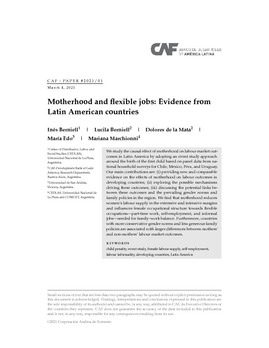Motherhood and flexible jobs: Evidence from Latin American countries
Resumo
We study the causal effect of motherhood on labour market outcomes in Latin America by adopting an event study approach around the birth of the first child based on panel data from national household surveys for Chile, Mexico, Peru, and Uruguay. Our main contributions are: (i) providing new and comparable evidence on the effects of motherhood on labour outcomes in developing countries; (ii) exploring the possible mechanisms driving these outcomes; (iii) discussing the potential links between these outcomes and the prevailing gender norms and family policies in the region. We find that motherhood reduces women’s labour supply in the extensive and intensive margins
and influences female occupational structure towards flexible occupations—part-time work, self-employment, and informal jobs—needed for family–work balance. Furthermore, countries with more conservative gender norms and less generous family policies are associated with larger differences between mothers’ and non-mothers’ labour market outcomes.
Assunto
País / Región
Data
2021-03-05Cite esta publicação
Item que pertence à coleção
Autor
Berniell, InésBerniell, Lucila
de la Mata, Dolores
Edo, María
Marchionni, Mariana
Items Relacionados
Women, Motherhood, and Structural Transformation. Insights from Rural Latin America
Structural transformation—the shift from agriculture to industry and services—is key to economic development and can reshape labor market gender gaps. ...
Motherhood and the missing women in the labor market
Motherhood currently stands out as a key determinant of the gender gap in labor market outcomes. Studies identifying the effect of children have mostly ...
Gender Gaps in Labor Informality: The Motherhood Effect
We estimate the short- and long-run labor market impacts of parenthood in a developing country, Chile, based on an eventstudy approach around the birth ...




